October 29, 2024: Another 12-unit development has been filed under Charlottesville's new zoning code that does not include affordable units
Plus: A written opinion has been published explaining why a Fairfax Circuit Judge nullified Arlington's middle-missing zoning
October 29, 2024 begins a series of days that occupy a unique position on the calendar. Is there a word in English for the days that are the fifth version of themselves in a month? Is there a word that serves as a collective noun for nieces and nephews, similar to siblings? Who gets to decide these things? There are no stories about that in this edition of Charlottesville Community Engagement but perhaps there could be. I’m Sean Tubbs, and I nominate “niblings” for the latter and will have to ponder on the former.
In today’s installment:
Fairfax County Judge David Schell has published a written opinion ordering a halt to Arlington’s new middle missing zoning
Plans have been filed for 12 units in Charlottesville right at the John Warner Parkway’s interchange with the U.S. 250 bypass
Charlottesville is seeking a firm to cull the number of deer in the city
The MPO Policy Board hears from city and VDOT staff about why they recommend changes to the classifications of some neighborhood streets
First shout-out: Five Things ReLeaf Cville Has Done This Year
In today’s first subscriber-supported shout-out: ReLeaf Cville seeks to help restore the amount of the city that’s covered by trees. This summer they accomplished five things they want people to know about:
Worked in partnership with the Rivanna Conservation Alliance on the third cycle of the Green Team, which teaches young people about the value of trees and the importance of their role in area water quality
The group was featured on VPM in late June to discuss their work to date (read the report)
Clean Virginia awarded the group $15,000 to enhance education programs to expand the Green Team
The Virginia Department of Forestry awarded the group $21,410 through the Virginia Trees for Clean Water Program to plant trees in the Woolen Mills neighborhood
ReLeaf collected $180.75 in lemonade sales from a stand in Peacock Hill
Written opinion issued in legal ruling that halted Arlington’s missing middle zoning
Charlottesville Circuit Court Judge Claude Worrell has still not issued a ruling on whether a lawsuit against the city’s zoning can proceed, but Fairfax County Judge David Schell has published a written opinion explaining why he ruled against Arlington County on a similar lawsuit in that locality.
“This matter started with the enactment by the [Arlington] Board on March 22, 2023 of a change to the Arlington’s zoning ordinance,” Schell wrote as background. “This change allowed builders to tear down single-family homes in single family neighborhoods and replace them by right with up to six-unit buildings known as multiplexes.” (read the ruling)
A group of plaintiffs filed suit arguing that allowing the changes by-right meant that no analysis had to be done on the impacts to sewer capacity, stormwater drainage, traffic congestion, local school enrollment, or neighborhood character.
“A zoning amendment that could essentially restructure the entire county and severely impact the rights of its citizens must be scrutinized carefully to ensure that the protections built into the Code of Virginia are respected and satisfied.”
The case of Nordgren v. Arlington did go to trial this summer with post-trial briefs turned in on August 23. On September 27, Judge Schell ruled in favor of the plaintiffs on four of seven counties and found that Arlington did not follow requirements laid out in the Code of Virginia.
These are:
Count 1: The Board failed to promulgate an initiating resolution or motion for the Zoning Amendment in accordance with Virginia Law
Count III: The Zoning Amendment is void ab initio because the Board acted ultra vires by failing to reasonably consider many Virginia Code 15.2.2284 factors
Count IV: The Board unlawfully delegated legislative authority in granting a special exception for [Expanded Housing Options] Development
Count VII: The landscaping provision of the Zoning Amendment renders the Zoning Amendment void ab initio because the Board acted ultra vires by acting contrary to Virginia Code 15.2-961
Ab initio means “from the beginning” and ultra vires means “acting or done beyond one's legal power or authority.”
In his ruling, Judge Schell writes that the case is not about the merits or need for additional housing, but whether Arlington followed the rules correctly.
That’s the same question in Charlottesville where a group of plaintiffs argue the city did not perform a sufficient transportation analysis to see if the city is prepared to handle the theoretical maximum density allowed under a new Development Code that allows for additional density without legislative review by the City Council.
Judge Schell was assigned to the case after judges on the Arlington County Circuit recused themselves due to perceived conflict of interest for them being homeowners in that locality. Judge Claude Worrell did not recuse himself despite owning property in Charlottesville.
Plans filed for 12 units near intersection of U.S. 250 / McIntire Road / John Warner Parkway
Arlington County has stopped processing applications made through the Expanded Housing Option pending appeal of Judge Schell’s ruling, but it is business as usual in Charlottesville which continues to receive new applications under the new Development Code.
A company called Middle Mountain LLC with a Crozet address has filed plans with the City of Charlottesville to build 12 townhouse units on a vacant property on Hillcrest Road right across the street from the Dogwood Vietnam Memorial.
The three vacant lots owned by Middle Mountain LLC are zoned Residential-A and the plans submitted by Shimp Engineering anticipate creation of a fourth. Three units would be built on each one. None of the units would be required to be reserved for households below certain income thresholds.
Each unit would be 40 feet tall and would provide the necessary right of way to the city for a clear walk zone and a greenspace zone.
Middle Mountain LLC has owned these lots since the summer of 2006.
Under the new Development Code, this is a by-right development and no special exceptions are being requested. This is the latest “major development plan” and others proposals include 2030 Barracks Road, 303 Alderman Road, 221 Carlton Road.
Shimp Engineering also filed the plans for 303 Alderman Road which anticipate demolition of a three story house single family house in favor of six units that take advantage of the Residential-B zoning. The city asked for a resubmission and new plans were submitted on October 25 that eliminated the need for a special exception to exceed height limitations by five feet. However, the company is now asking for a special exception to the city’s streetscape requirements. (read the details)
Greenshire Holdings LLC has submitted plans to build 24 units at 2030 Barracks Road, a property that’s currently wooded and undeveloped. It appears that the city has asked for a resubmission, but none of the documents are in the development portal accessible to members of the public. (read more details)
Earlier this month, the Board of Architectural Review reviewed plans for a nine-unit building proposed at 1609 Gordon Avenue. That development anticipates nine units, one fewer than the threshold that kicks in the city’s inclusionary zoning provisions that require affordable units to be part of a project. I have not been able to write that story yet.
Procurement round-up: Charlottesville seeking firms to cull deer
Charlottesville City Council adopted a resolution on March 20, 2017 to allow an urban archery program for the purposes of killing deer within the city.
“City Council approved the program in response to numerous and sustained complaints about hazardous driving conditions, health concerns stemming from Lyme disease, landscapes being impacted by an overabundant deer population, and the health of the local herd,” reads a request for proposals for a firm to do the work.
Since 2018, Blue Ridge Wildlife & Pest Management has had the contract. On Monday the city issued a new RFP and responses are due on November 26. (learn more)
According to the statement of needs in the RFP, the contractor will work with the Charlottesville Police Department to obtain all kill permits. The resolution from 2017 specifically called for bows to be used, but this RFP states that rifles can be used.
“Contractor will do all work involving baiting, culling, shooting and clean up,” the RFP reads. “Hunting operations are to be conducted at night, after parks are closed.”
The contractor also has to contact the Charlottesville-UVA-Albemarle County Emergency Communications Center to notify them of stop and start times for operations.
The deer must be donated to Hunters for the Hungry, a group that works all across Virginia. Currently they do not process deer from Frederick County due to the presence of chronic wasting disease.
In other procurement activity:
The city is seeking a firm to update the fire alarm system at City Hall. Bids are due on November 1. (learn more)
The city seeks a firm to replace the fire pump at the Jefferson Madison Regional Library at 201 East Market. The RFP states the existing one is 44 years old and “although it has passed mandatory annual testing, it is no longer safe to rely on for fire protection.” (learn more)
Jarema Landscapes of Wake Forest, North Carolina, has been awarded a contract for tree planting and watering. The planting contract is for $57,057 and will range from three American Basswood trees to eight Yellowwood trees. The watering and inspections contract is for $2,624. (learn more)
On October 7, 2024, Albemarle County awarded a contract to Executive Defense Industries for Turbo-X Riot Suite & Interlocking Riot Shields for the Charlottesville Police Department. This was made on an emergency basis under Virginia Code § 2.2-4303 (F) which does not require the amount to be published.
Fluvanna County is accepting bids for a new administration and social services building as well as renovation of the existing one. These are due on November 1. (learn more)
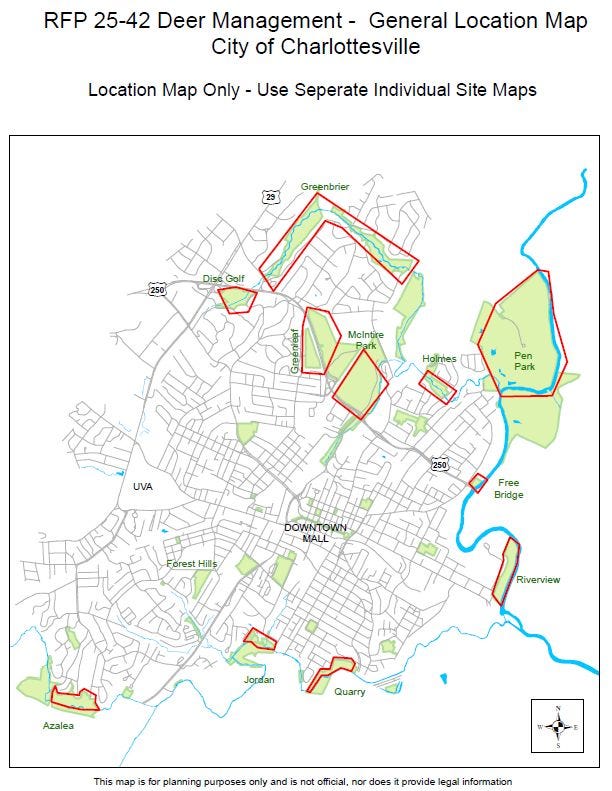
Second-shout: Friends of Charlottesville shed a Downtown Spotlight
In today’s second subscriber-supported shout-out: Friends of Cville have launched a new web show called the Downtown Spotlight that brings conversations from local business owners, community leaders, and more who make up the Downtown Mall. Each episode will feature in-depth interviews, behind-the-scenes looks at beloved local establishments, and stories that highlight the spirit of our community. The most recent show featured:
The Executive Director and Artistic Director of the Virginia Film Festival
The Executive Director of the Charlottesville Albemarle Convention and Visitors Bureau
The owner of PawPrints Boutique about all things Doggie Howl-o-ween!
The Downtown Spotlight will air the second Thursday of each month, at 2:30pm. View all of the episodes through the organization’s Facebook page.
Federally-mandated transportation body endorses changes to road classifications
A democratic system of government allows people to make comments about intricate details on public policy. That was the case at the October 23 meeting of the Charlottesville-Albemarle Metropolitan Planning Organization Policy Board when the body was expected to take a final vote on changes to how the Federal Highway Administration classifies some city streets.
Every ten years after a Census, the FHA updates the “functional classification” of roadways that describes how they are being used. These range from “local road” to “interstate highway.”
For background, here’s a story I wrote earlier this month that is posted to Information Charlottesville.
Each MPO Policy Board meeting begins with a public comment period.
On October 23, East Market Street resident and former Charlottesville Planning Commissioner Bill Emory said members of the Woolen Mills neighborhood have been asking for traffic calming measures since 1988. He presented a petition asking that the city not recommend a classification change for his street from “local road” to “minor collector.”
“If they are now federally functionally classified as collector roads, that designation will weigh against the neighborhood's use of the Commons for the next 100 years,” Emory said. “There's a stark difference between applying labels and thoughtful planning.”
Mobility activist Kevin Cox was concerned that changing the designation would eventually lead to planning to build a second vehicular bridge.
“Transportation planners, who are sort of separated from the community or whatever, look at a map and you see downtown and you see this straight line that goes right to the interstate at Shadwell,, and that straight line goes down Market street and across the Rivanna river, that is going to be perennial problem,” Cox said. “It's a natural route and people are going to see it, say, that's where we need a second bridge to divert the flow from Free Bridge. So this is going to come up. I don't trust this because I really do fear that this is the beginning setting the stage for that future.”
There are no plans for such a bridge but the MPO Policy Board has endorsed a proposal to build a pedestrian bridge across the Rivanna at the end of Market Street near the Wool Factory. That project remains in limbo after an increase in the cost estimate and a failure to qualify for Smart Scale funding.
Christine Jacobs, the executive director of the Thomas Jefferson Planning District Commission, said that the review of functional classifications began this spring. The TJPDC also operates the MPO.
“In early May, MPO staff sent a request to all locality staff for their detailed review and included in that email the draft GIS map, the comprehensive [functional classification] guide with all of the criteria and procedures to review and the methodology that was used for the review,” Jacobs said.
The three MPO committees were presented with the information in May as well as an initial assessment of changes made by staff at the Virginia Department of Transportation. Recommendations from local staff went through the MPO committees in August, but a vote was deferred because there was no map depicting all of the changes. That was ready by the October 23 meeting and Jacobs said the MPO’s vote was key to illustrate local approval of the federally-mandated process.
“So before the Policy Board tonight is a final revised version of that map along with a resolution that asks you to consider approval of the proposed changes, as well as documenting within that resolution, documenting to [Federal Highway Administration] that the MPO was participating within VDOT's review, that it wasn't done completely by VDOT staff, that it involved the CAMPO and locality staff in that review and then the state, upon your consideration, if that were approved, the state would then send the resolution and the finalized map up to Federal Highways for their review,” Jacobs said.
Ben Chambers, the city’s transportation planning manager, said Charlottesville’s review sought to see if roads were still appropriate given any changes in conditions that might have occurred. For instance, a portion of 9th Street SW in Fifeville from Estes to King Street is still listed as a minor collector despite being a cul-de-sac. That’s leftover from before construction the Roosevelt Brown Boulevard.
“Then we went into lower density neighborhoods like Woolen Mills, Johnson Village,” Chambers said. “We looked at some of the streets and [asked] how are these streets functioning? Because we know that there is traffic flowing through these neighborhoods.”
Chambers said staff looked at traffic volumes, the current physical conditions of the streets, and destinations. They also look at whether there was transit service and whether there were sidewalks.
This resulted in several recommended changes:
Hillsdale Drive from local road to major collector
Cherry Avenue from Ridge Street to Roosevelt Brown from major collector to minor arterial
Chesapeake and East Market Street in the Woolen Mills from local road to minor collector
Franklin Street from Meade to Carlton Avenue from local road to minor collector
Prospect Avenue from 9th Street SW to Bailey Road from local road to minor collector
Bailey Road from Fifth Street SW from local road to minor collector
Rose Hill Drive from Oakleaf Lane to Rugby Avenue from local road to major/minor collector
Chambers said one goal is to be able to get federal funding for improvements to some of these roads. He said the work is intended to describe what the roads are doing now as opposed to planning for future growth.
In Albemarle County, many of the changes from major collector to minor arterial are intended to ensure the roadways are eligible to serve as entrance corridors.
Supervisor Ann Mallek, an MPO Policy Board member, asked if any of the changes would make it harder to slow down traffic as they pass through neighborhoods. Chuck Proctor, a VDOT engineer, explained some of the parameters.
“In the guidelines for functional classification, as long as you're below an arterial, you can do a lot of things from a traffic calming perspective,” Proctor said. “They're not prohibited. Once you become an arterial, that's when a lot more stricter regulations come. Basically, those roads are for a lot more through traffic and to carry your commercial and your larger vehicles through your network.”
Proctor said in the case of Market Street and Chesapeake, they were suggested to be upgraded to minor collector because Charlottesville Area Transit operates the Route 1 service on them. Additionally, Riverview Park is a destination. Proctor said Charlottesville makes its own decisions on roads rather than VDOT.
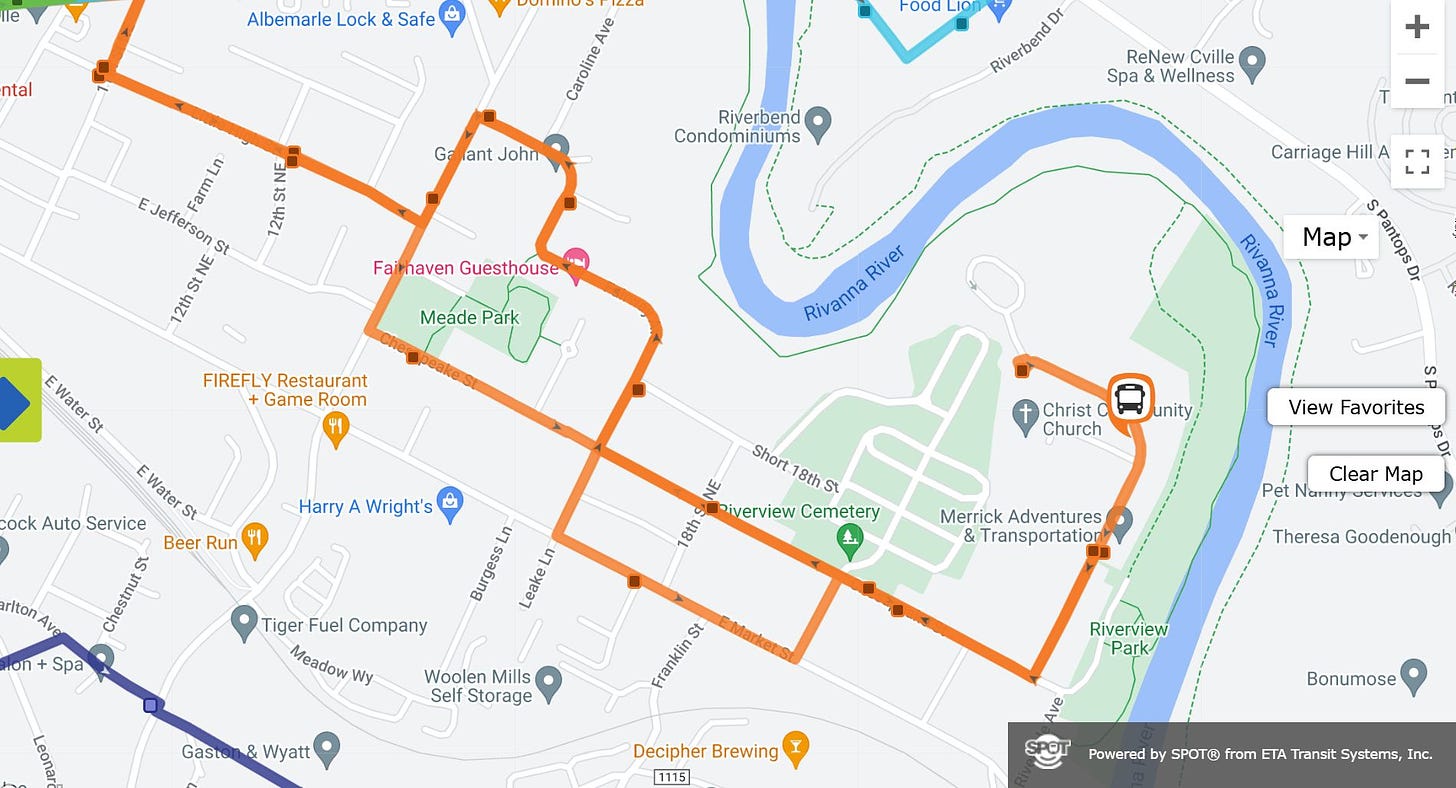
Chambers said the changes are meant to draw down more money to make the city more walkable and bikeable. There are many different types of grant applications and these changes might help them stand out.
“Updating functional classification just gets us opportunities to get funding for paving, it gets us opportunities to get funding for roads, for things like SmartScale and for things like [Transportation Alternatives Program] funding, where you might want to be able to point out that, hey, this is an important street in our neighborhood that we need to focus on,” Chambers said.
Chambers had the support of City Councilor Natalie Oschrin, who said she had been concerned about the city changes when it was last before the MPO.
“I've been talked into understanding it better,” Oschrin said. “I empathize with all of the commentary that we've been getting from people who haven't gotten these full presentations and are nervous that this sounds like, okay, we're gonna now we're available to widen your road and then you're gonna put up, you know, big highway construction in your city. Because that has happened before. There is evidence of that. So I get that sense of unease. But this isn't that.”
City Councilor Brian Pinkston told the MPO Policy Board that two days before their October meeting, City Manager Sam Sanders announced he had tasked staff to look at the possibility of lowering the speed limit to 25 miles per hour across the city.
The MPO Policy voted unanimously to recommend the changes which will now go to the Federal Highway Administration for approval.
Reading material for #751
CAT to reduce wait times on 2 city bus routes, Jason Armesto, Charlottesville Daily Progress (paywall), October 28, 2024
Voter Guide: Neely T. Hull is the only certified candidate for Nelson County Treasurer, Charlottesville Tomorrow, October 28, 2024
Voter Guide: Four candidates are running for three seats on Louisa Town Council, Charlottesville Tomorrow, October 28, 2024
Quieting the time when #751 got to speak
As I send this, it does not appear that the U.S. Supreme Court has responded to a deadline from the Commonwealth of Virginia related to the voter purge efforts Governor Glenn Youngkin put into effect in August 7.
I also can’t turn a piece of information I just got from Albemarle County into a story today.
I’ve got to be on the radio in 45 minutes so I’ve got to hit send on these four stories. In my perfect world, I’m part of an operation that works around the clock to make sure people have access to information. After four and a half years of doing this work, my vision is getting more expansive and last week I even reserved a new domain name for something new.
I’m not there yet, but I’m grateful to all who are reading, all who are contributing, and to those who provide helpful feedback. This is still an experiment and likely will always be. That’s the way I’ve always lived my personal and professional life.
If you would like to support through Substack, that’s a good way to do it. They will charge you on a recurring basis, though, and some people don’t like that. You can also mail me a check. You can also just tell other people about the work.
If you want to volunteer, I have ways to put you to work. I can’t pay anyone yet, because I lack a staff that can help me find funding. I also never want this work to be led by the funding. And so on.
If you pay through Substack, Ting will match your initial payment.
If you sign up for service and you are within Ting’s service area, enter the promo code COMMUNITY you’re going to get:
Free installation
A second month for free
A $75 gift card to the Downtown Mall



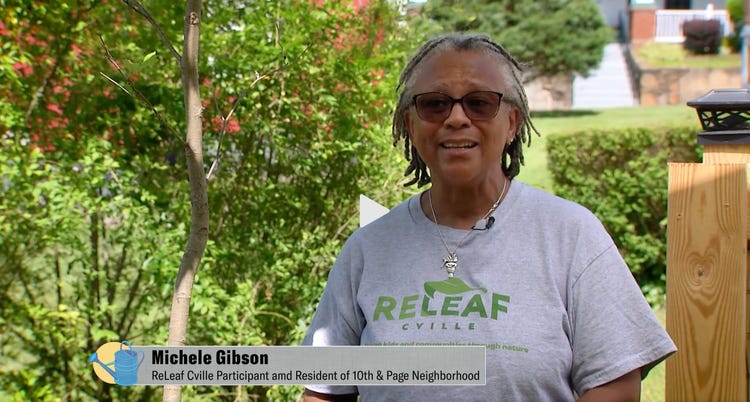
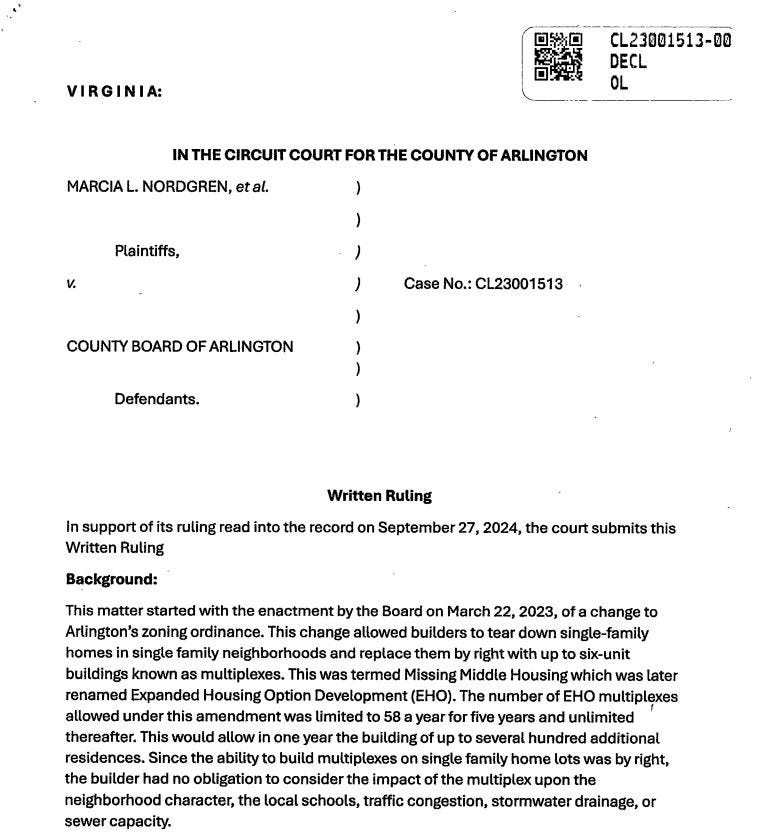
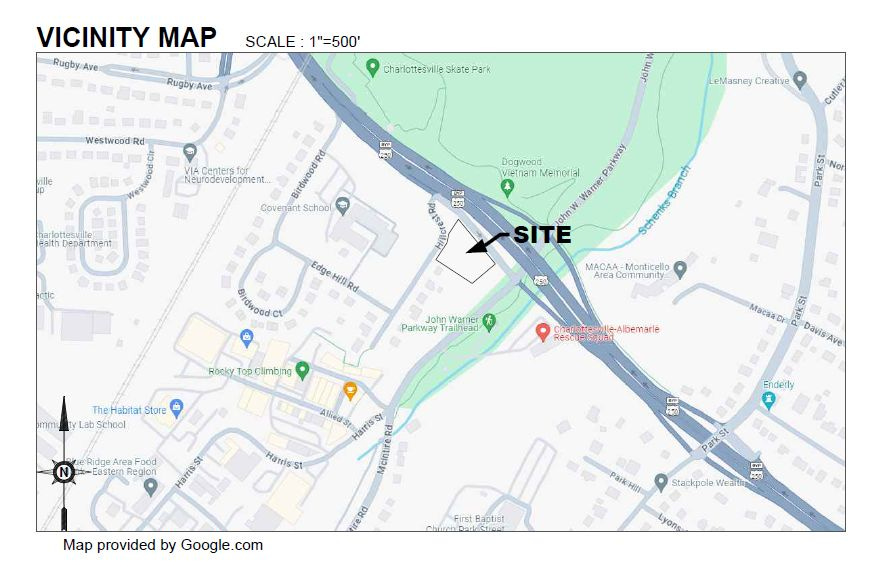

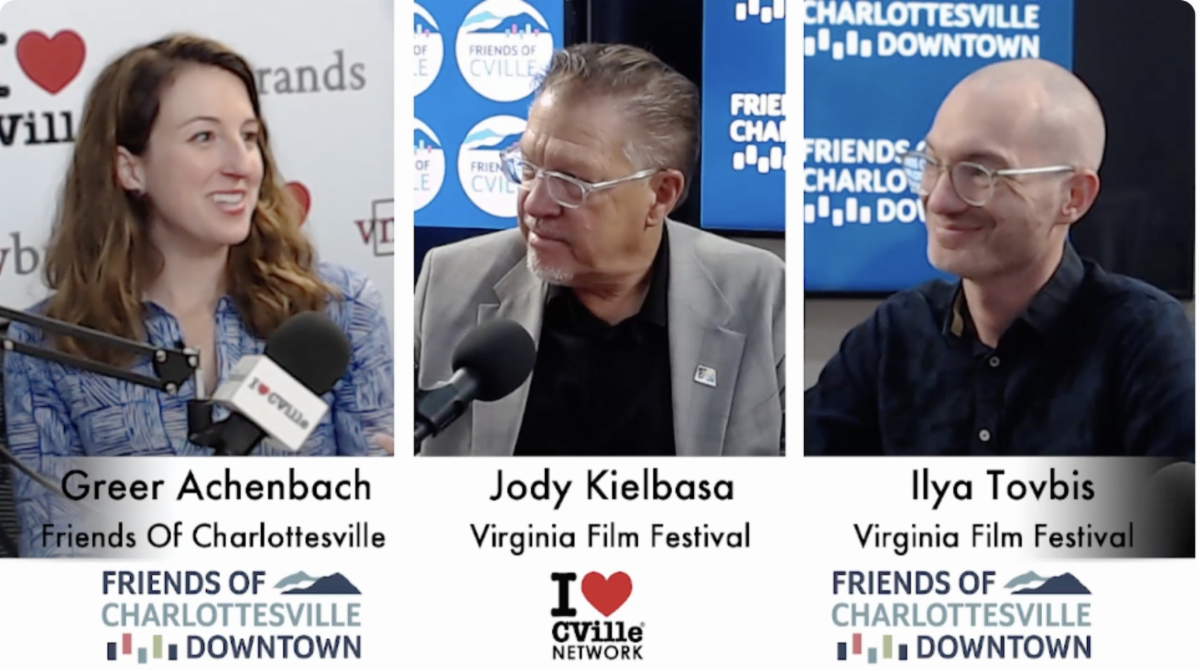

@Sean - Consider your phrasing here with new multi-family that's being built without "affordable units." Are you applying this same logic to single-family home sales in Charlottesville? For instance, consider a $1m house off Rugby Road that is sold to a non-developer. Odds are (extremely) high that said lot will continue to be just a house, and the lot will continue to not be "affordable." But, no vitriol or even a remark in your newsletter about the sale.
The segment on the Hillcrest Development has been updated to correct an error. 303 Alderman is a single-family house that will be replaced by six townhouses that are three stories in height on the same lot. I incorrectly described the unit as you can see in the strike-through text in the segment.
Additionally, the headline for this entire newsletter likely should have not brought up the affordability component because the story itself does not do enough to explain some of the distinctions. This will be corrected as that segment is posted to Information Charlottesville. I appreciate everyone's patience as I continue this experiment in local journalism.